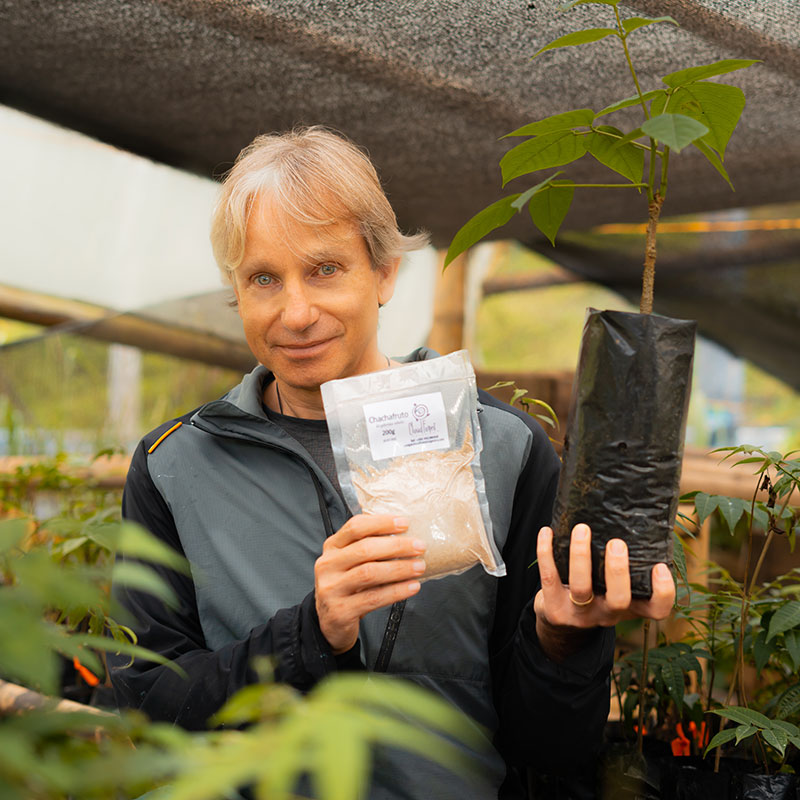Craig Leon ’85 Is Growing Native Foods in Ecuador’s Cloud Forest
‘What if we were able to create an agroforestry system that brings back wildlife habitat?’
“The cloud forests of the world are nearly wiped out,” said Leon, one of Princeton’s two 1985 Pyne Prize recipients. “And yet it is a magical place. The sound of the rain is intense and beautiful. You can hear the mists. Sometimes you can even hear the clouds.”
Over decades of research and exploration, Leon has discovered a cornucopia of remarkable yet little-known foods in the cloud forests of Ecuador — foods that Leon believes were in favor among local peoples until the 1400s, when the Incas invaded and imposed their own food culture upon the territory. Foods like the lucuma, a fruit the flavor of caramel. Or the tocte, a wild and now endangered walnut. Or the porotón, a tree legume with a protein content comparable to eggs.
In 2018, Leon founded Cloud Forest Organics to bring these foods to the public. The organization operates 30 miles south of the equator, on a 170-acre parcel of land that had, when Leon bought it in 2012, been mostly deforested for cattle ranching. Leon and his colleagues have since been rewilding the property to produce naturally occurring foods for commercial sale. But profit is only a piece of Leon’s vision: His larger aim is to restore and conserve cloud forests by developing an alternative food production system.
“We want to create a new agroforestry model that can be adopted by neighboring farmers,” said Leon. “We’re trying to begin a transition from cattle ranching and forest destruction toward a system of producing food that is hospitable to plants and wildlife on the brink of extinction, while also providing a livelihood for local farmers.”
Leon is no stranger to strange foods. At Princeton, he wrote an award-winning economics thesis — titled “No More Banana Republic” — that analyzed the potential for developing countries to diversify their exports with nontraditional agricultural products. After graduating, he received the Labouisse ’26 Fellowship to apply his research in Ecuador. He became the first exporter of yellow honeydew melons and used the revenue from that venture to explore forgotten foods in the Andean highlands. In 1992, he co-founded Andean Organics, the first certified organic farm in Ecuador, and began selling quinoa — a staple crop of the Incan empire that had fallen out of favor after the Spanish conquest. By the early 2000s, more than 20 certified organic farms operated in Ecuador, and quinoa was a significant export.
Still, Leon was unsatisfied. He had played a key role in bringing nutritious, organic foods to the world, but he hadn’t managed to slow the mass deforestation of the land he had come to love. So he began dreaming up a more radical model — one he began building in 2012 with Cloud Forest Organics.
“I’d begun to think that organic agriculture wasn’t enough,” Leon recalled. “What if we were able to create an agroforestry system that brings back wildlife habitat, that brings back plants that are at the brink of extinction, and that also creates the next generation of superfoods? And what if that system also creates a financial opportunity for local landowners?”
The organization’s uncompromising ideals present considerable challenges. Rewilding the land takes years of patient work with no profit. Introducing new foods to the global market requires research, permits, and safety approval — all of which take money, of which Cloud Forest Organics has little. The organization is operating on a shoestring budget provided by Leon, nonprofits, and private donors. For all of Leon’s business experience and credentials — in addition to the Pyne Prize and the Labouisse, he has received a Fulbright fellowship and an MBA from Harvard — the financial success of Cloud Forest Organics remains on the distant horizon.
In the meantime, the project is already paying nonmonetary dividends. Native plants, birds, fish, amphibians, and mammals all seem to be returning to the land in remarkable numbers. Leon has installed camera traps on the property to monitor wildlife, and they’ve recorded tapirs, black-and-chestnut eagles, spectacled bears, and even a black ocelot — a wild cat that has been documented only a few times since the 19th century.
“Nature has responded quicker than we expected,” said Leon. “Even if this project had no commercial value — even if we never sold a single product — would we still do it? The answer is absolutely yes.”










No responses yet